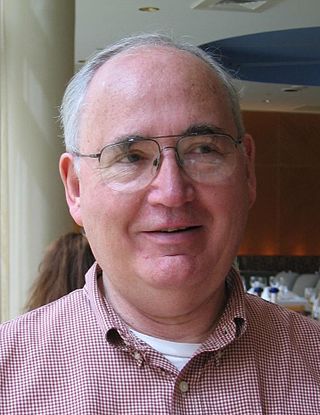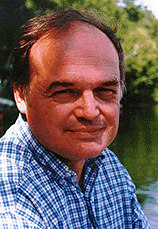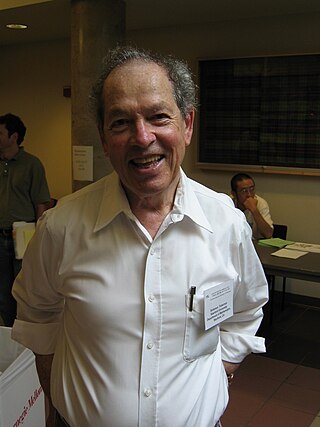Geoffrey Hellman | |
|---|---|
| Born | August 16, 1943 |
| Alma mater | Harvard University |
| Era | Contemporary philosophy |
| Region | Western philosophy |
| School | Analytic philosophy |
Main interests | Philosophy of mathematics |
Notable ideas | Mathematical structuralism (modal variety) [1] |
Geoffrey Hellman (born August 16, 1943 [2] ) is an American professor and philosopher. He is Professor of Philosophy at the University of Minnesota in Minneapolis, Minnesota. [3] He obtained his B.A. (1965) and Ph.D. (1972) degrees in philosophy from Harvard University. He was elected to the American Academy of Arts and Sciences in 2007.
In ontology, the theory of categories concerns itself with the categories of being: the highest genera or kinds of entities according to Amie Thomasson. To investigate the categories of being, or simply categories, is to determine the most fundamental and the broadest classes of entities. A distinction between such categories, in making the categories or applying them, is called an ontological distinction. Various systems of categories have been proposed, they often include categories for substances, properties, relations, states of affairs or events. A representative question within the theory of categories might articulate itself, for example, in a query like, "Are universals prior to particulars?"
The philosophy of mathematics is the branch of philosophy that studies the assumptions, foundations, and implications of mathematics. It aims to understand the nature and methods of mathematics, and find out the place of mathematics in people's lives.

Friedrich Ludwig Gottlob Frege was a German philosopher, logician, and mathematician. He was a mathematics professor at the University of Jena, and is understood by many to be the father of analytic philosophy, concentrating on the philosophy of language, logic, and mathematics. Though he was largely ignored during his lifetime, Giuseppe Peano (1858–1932), Bertrand Russell (1872–1970), and, to some extent, Ludwig Wittgenstein (1889–1951) introduced his work to later generations of philosophers. Frege is widely considered to be the greatest logician since Aristotle, and one of the most profound philosophers of mathematics ever.

Alfred Tarski was a Polish-American logician and mathematician. A prolific author best known for his work on model theory, metamathematics, and algebraic logic, he also contributed to abstract algebra, topology, geometry, measure theory, mathematical logic, set theory, and analytic philosophy.
The history of logic deals with the study of the development of the science of valid inference (logic). Formal logics developed in ancient times in India, China, and Greece. Greek methods, particularly Aristotelian logic as found in the Organon, found wide application and acceptance in Western science and mathematics for millennia. The Stoics, especially Chrysippus, began the development of predicate logic.
In logic, Richard's paradox is a semantical antinomy of set theory and natural language first described by the French mathematician Jules Richard in 1905. The paradox is ordinarily used to motivate the importance of distinguishing carefully between mathematics and metamathematics.

Dana Stewart Scott is an American logician who is the emeritus Hillman University Professor of Computer Science, Philosophy, and Mathematical Logic at Carnegie Mellon University; he is now retired and lives in Berkeley, California. His work on automata theory earned him the Turing Award in 1976, while his collaborative work with Christopher Strachey in the 1970s laid the foundations of modern approaches to the semantics of programming languages. He has also worked on modal logic, topology, and category theory.

George Stephen Boolos was an American philosopher and a mathematical logician who taught at the Massachusetts Institute of Technology.

Solomon Feferman was an American philosopher and mathematician who worked in mathematical logic. In addition to his prolific technical work in proof theory, computability theory, and set theory, he was known for his contributions to the history of logic and as a vocal proponent of the philosophy of mathematics known as predicativism, notably from an anti-platonist stance.

Richard Merritt Montague was an American mathematician and philosopher who made contributions to mathematical logic and the philosophy of language. He is known for proposing Montague grammar to formalize the semantics of natural language. As a student of Alfred Tarski, he also contributed early developments to axiomatic set theory (ZFC). For the latter half of his life, he was a professor at the University of California, Los Angeles until his early death, believed to be a homicide, at age 40.
In the foundations of mathematics, classical mathematics refers generally to the mainstream approach to mathematics, which is based on classical logic and ZFC set theory. It stands in contrast to other types of mathematics such as constructive mathematics or predicative mathematics. In practice, the most common non-classical systems are used in constructive mathematics.
Charles Dacre Parsons is an American philosopher best known for his work in the philosophy of mathematics and the study of the philosophy of Immanuel Kant. He is professor emeritus at Harvard University.

The linguistic turn was a major development in Western philosophy during the early 20th century, the most important characteristic of which is the focusing of philosophy primarily on the relations between language, language users, and the world.
In mathematics, logic and philosophy of mathematics, something that is impredicative is a self-referencing definition. Roughly speaking, a definition is impredicative if it invokes the set being defined, or another set that contains the thing being defined. There is no generally accepted precise definition of what it means to be predicative or impredicative. Authors have given different but related definitions.
Stewart Shapiro is O'Donnell Professor of Philosophy at the Ohio State University and distinguished visiting professor at the University of Connecticut. He is a figure in the philosophy of mathematics where he defends the abstract variety of structuralism.
In the philosophy of mathematics, formalism is the view that holds that statements of mathematics and logic can be considered to be statements about the consequences of the manipulation of strings using established manipulation rules. A central idea of formalism "is that mathematics is not a body of propositions representing an abstract sector of reality, but is much more akin to a game, bringing with it no more commitment to an ontology of objects or properties than ludo or chess." According to formalism, the truths expressed in logic and mathematics are not about numbers, sets, or triangles or any other coextensive subject matter — in fact, they aren't "about" anything at all. Rather, mathematical statements are syntactic forms whose shapes and locations have no meaning unless they are given an interpretation. In contrast to mathematical realism, logicism, or intuitionism, formalism's contours are less defined due to broad approaches that can be categorized as formalist.
Nonstandard analysis and its offshoot, nonstandard calculus, have been criticized by several authors, notably Errett Bishop, Paul Halmos, and Alain Connes. These criticisms are analyzed below.

John Corcoran was an American logician, philosopher, mathematician, and historian of logic. He is best known for his philosophical work on concepts such as the nature of inference, relations between conditions, argument-deduction-proof distinctions, the relationship between logic and epistemology, and the place of proof theory and model theory in logic. Nine of Corcoran's papers have been translated into Spanish, Portuguese, Persian, and Arabic; his 1989 "signature" essay was translated into three languages. Fourteen of his papers have been reprinted; one was reprinted twice.
Structuralism is a theory in the philosophy of mathematics that holds that mathematical theories describe structures of mathematical objects. Mathematical objects are exhaustively defined by their place in such structures. Consequently, structuralism maintains that mathematical objects do not possess any intrinsic properties but are defined by their external relations in a system. For instance, structuralism holds that the number 1 is exhaustively defined by being the successor of 0 in the structure of the theory of natural numbers. By generalization of this example, any natural number is defined by its respective place in that theory. Other examples of mathematical objects might include lines and planes in geometry, or elements and operations in abstract algebra.
Wanda Szmielew née Montlak was a Polish mathematical logician who first proved the decidability of the first-order theory of abelian groups.